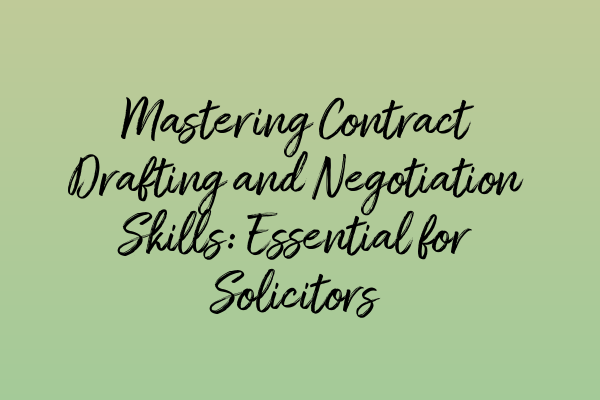Mastering Contract Drafting and Negotiation Skills: Essential for Solicitors
Contract drafting and negotiation are essential skills that every solicitor must master. A well-drafted contract can prevent disputes, protect your client’s interests, and ensure smooth business transactions. On the other hand, poor drafting and negotiation can lead to costly litigation and damage the reputation of both you and your firm. In this article, we will discuss the importance of mastering contract drafting and negotiation skills and provide some tips to help you become a proficient solicitor in this area.
The Importance of Contract Drafting Skills
Contract drafting is a fundamental part of legal practice. It involves creating an agreement that clearly outlines the rights, obligations, and responsibilities of the parties involved. A well-drafted contract should be clear, unambiguous, and comprehensive. It should anticipate potential issues, provide remedies for breaches, and protect your client’s interests.
Having strong contract drafting skills is crucial for several reasons:
- Preventing disputes: A precisely drafted contract can help prevent misunderstandings and disputes between parties. By clearly stating the terms and conditions of the agreement, you reduce the risk of future disagreements.
- Protecting your client: As a solicitor, your primary responsibility is to protect the interests of your client. A well-drafted contract ensures that your client’s rights are safeguarded and any potential risks or liabilities are properly addressed.
- Establishing trust: Your credibility as a solicitor is closely tied to your ability to draft clear and concise contracts. A poorly drafted contract can erode trust and damage your professional reputation. Conversely, a well-drafted contract demonstrates your expertise and professionalism.
To enhance your contract drafting skills, it is essential to understand the key elements of a contract:
- Offer and acceptance: Clearly identify the parties involved in the agreement and ensure there is a mutual meeting of minds regarding the terms and conditions.
- Consideration: Specify what each party will give or receive as part of the contract, whether it is money, goods, or services.
- Terms and conditions: Outline the essential terms of the agreement, including the duration, payment terms, obligations, and any other important provisions.
- Dispute resolution: Include mechanisms for resolving disputes, such as mediation, arbitration, or litigation.
- Termination: Clearly define the circumstances under which the contract can be terminated and the consequences of termination.
By mastering these elements and consistently practicing your contract drafting skills, you will become a proficient solicitor in this area.
The Art of Contract Negotiation
In addition to drafting contracts, solicitors must also possess strong negotiation skills. Contract negotiation is the process of reaching a mutually acceptable agreement between the parties involved. It requires effective communication, persuasive argumentation, and the ability to find common ground.
Successful contract negotiation can lead to several benefits:
- Achieving favorable outcomes: Good negotiation skills can help you secure favorable terms for your client. By being assertive yet cooperative, you can influence the other party and reach a mutually beneficial agreement.
- Preserving relationships: Contract negotiations can be tense, but maintaining a respectful and professional demeanor is crucial. By focusing on the issues at hand rather than personal attacks, you can build and preserve positive working relationships.
- Adapting to changing circumstances: Negotiations often involve give-and-take. Being flexible and open to alternatives allows you to navigate unexpected challenges and find creative solutions.
To become a skilled negotiator, consider the following tips:
- Prepare thoroughly: Before entering into negotiations, thoroughly research the parties involved, their interests, and potential areas of compromise. Familiarize yourself with relevant laws, regulations, and industry standards.
- Listen actively: Effective negotiators listen attentively to the other party’s concerns and viewpoints. By understanding their perspective, you can address their needs and find mutually acceptable solutions.
- Communicate effectively: Clearly articulate your client’s position, interests, and objectives. Use persuasive and logical arguments supported by relevant facts and precedents.
- Be patient and resilient: Negotiations can be challenging and may require several rounds of discussions. Stay patient, maintaining a positive attitude throughout the process. Be resilient in seeking compromise and finding common ground.
Conclusion
Mastering contract drafting and negotiation skills is essential for solicitors. These skills allow you to create legally sound agreements that protect your client’s interests and contribute to their success. By consistently honing these skills, you will become a trusted and sought-after solicitor.
If you’re interested in related topics, we encourage you to explore our other articles:


Leave a Reply